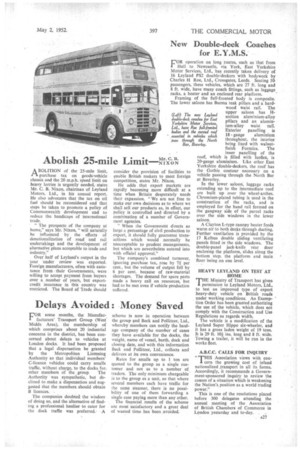Abolish 25-mile Limit M r.
Page 29

If you've noticed an error in this article please click here to report it so we can fix it.
A BOLITION of the 25-mile limit, rns purchase tax on goods-vehicle chassis and the 20 m.p.h. speed limit on heavy lorries is urgently needed, states Mr. C. B. Nixon, chairman of Leyland Motors, Ltd., in his annual report. He also advocates that the tax on oil fuel should be reconsidered and that steps be taken to promote a policy of Commonwealth development and to reduce the handicaps of international trade.
" The prospects of the company at home," says Mr. Nixon, "will naturally be influenced by the effects of denationalization of road and rail undertakings and the development of alternative plans acceptable to trade and industry."
Over half of Leyland's output in the year under review was exported. Foreign manufacturers, often with assistance from their Governments, were willing to accept payment from buyers over a number of years, but exportcredit insurance in this country was restricted. The Board of Trade should consider the provision of facilities to enable British makers to meet foreign competition, states Mr. Nixon.
He adds that export markets are rapidly becoming more difficult at a time when Britain desperately needs their expansion. "We are not free to make our own decisions as to where we shall sell our products as, in effect, our policy is controlled and directed by a combination of a number of Government agencies.
" When the Government directs so large a percentage of civil production to export, it should fully guarantee transactions which would normally be unacceptable to prudent managements, but which are nevertheless entered into with official approval."
The company's combined turnover, ignoring purchase tax, rose by 71per cent., but the volume of output fell by 6 per cent. because of raw-material shortages. The demand for spare parts made a heavy call on resources, but had to be met even if vehicle production suffered.




















































































